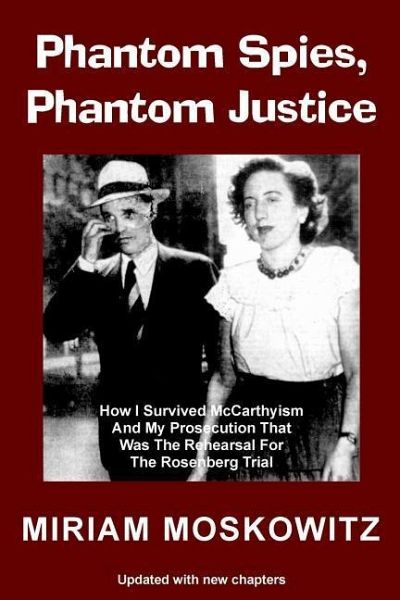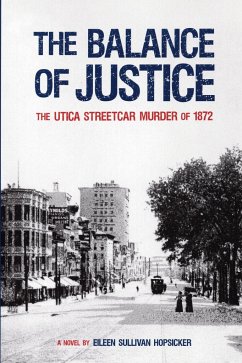
Phantom Spies, Phantom Justice: How I Survived McCarthyism And My Prosecution That Was The Rehearsal For the Rosenberg Trial -- Updated Edition
Versandkostenfrei!
Nicht lieferbar
The human cost of the anti-Communist witch-hunt during the McCarthy era is brought to life in Phantom Spies: Phantom Justice - Miriam Moskowitz' personal account of that terrible time. Ms. Moskowitz' was arrested in 1950 and prosecuted for conspiracy to obstruct justice during a grand jury investigation of suspected Soviet espionage. She was sensationally branded by the prosecution and in news stories as part of an atom bomb spy ring. Yet it was a lie. And her prosecutors knew it was a lie. Phantom Spies: Phantom Justice reveals through Ms. Moskowitz' many years of diligent research of court r...
The human cost of the anti-Communist witch-hunt during the McCarthy era is brought to life in Phantom Spies: Phantom Justice - Miriam Moskowitz' personal account of that terrible time. Ms. Moskowitz' was arrested in 1950 and prosecuted for conspiracy to obstruct justice during a grand jury investigation of suspected Soviet espionage. She was sensationally branded by the prosecution and in news stories as part of an atom bomb spy ring. Yet it was a lie. And her prosecutors knew it was a lie. Phantom Spies: Phantom Justice reveals through Ms. Moskowitz' many years of diligent research of court records, FBI documents and other sources that her prosecutors knew she was innocent, and yet kept silent as the lone witness against her repeatedly lied during his testimony. After she was convicted of conspiracy to obstruct justice FBI officials and the government's lawyers also remained silent as she was sentenced to two years in federal prison and fined $10,000. Now in her mid-90s, Ms. Moskowitz has lived for 62 years with the false stigma of being a convicted felon and an enemy of the United States. This updated edition includes two new chapters, additional photos, and FBI documents with proof of her innocence that the prosecutors concealed from her lawyers, the trial judge, the jurors, and the appeals court judges who upheld her conviction in 1951. One of the new chapters elaborates on Ms. Moskowitz' experience in prison with Iva Toguri d'Aquino, who was wrongly identified as Tokyo Rose and falsely convicted of treason in 1949. She was granted a full and unconditional pardon in 1976 by President Ford based on newly discovered evidence that the government's two key witnesses committed perjury at the behest of the prosecution. David Alman, co-founder in 1951 of the National Committee to Secure Justice in The Rosenberg Case, and co-author of Exoneration: The Trial of Julius and Ethel Rosenberg and Morton Sobell (2010), writes in the Foreword: "A few simple questions may occur to readers after they turn the last page of Phantom Spies: Phantom Justice: How did all this happen? What happened to the Constitution? What happened to the conventional concept of Americanism? Where was our vaunted media? Where were the whistleblowers?" Hans Sherrer, editor and publisher of Justice Denied - the magazine for the wrongly convicted, writes in the Afterword: "Miriam Moskowitz is an innocent person who was caught up in the whirlwind of anti-communist hysteria that prevailed in this country at the time of her trial in 1950. Her book is much more than a personal memoir, it is a valuable well-documented first-hand account that both corrects and contributes to the historical record of the McCarthy era." Barbara Jean Trembley, Curator of Personal Documents for the Iva Ikuko Toguri Estate writes: "Miriam Moskowitz draws back the curtain on a distinct history when justice was obscured by politics and personal agendas. Ms. Moskowitz proves once again the adage that truth gains power over time." Michael Meeropol, older son of Ethel and Julius Rosenberg writes about Phantom Spies: Phantom Justice: "Miriam Moskowitz' story about how she became "collateral damage" in the government's pursuit of real and fake spies is a must reading for all who cherish our constitutional form of government. Her survival and personal triumph should be celebrated by us all."





